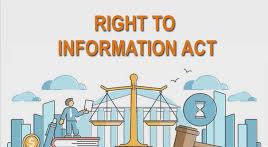INTRODUCTION:
The success of any democracy rests on the principle of transparency and accountability. In a country like India, citizens must have the right to know what decisions the government is making on their behalf, how public funds are being utilized, and how policies are being implemented. RTI empowers the common citizen to access such information, thereby ensuring openness and trust in the functioning of the state.
MEANING AND DEFINITION
RTI is a legal right that enables Indian citizens to request information from government departments and institutions. It aims to promote transparency and empower people to actively participate in governance.
In simple terms, RTI is a tool that allows any citizen to ask, Why was a particular decision taken? On what basis? Who benefited? How much public money was spent.
OBJECTIVES OF RTI:
- To ensure transparency—to expose and curb corruption by making government activities open to public scrutiny.
- To establish accountability—to make public officials answerable for their decisions and actions.
- To empower citizens—to encourage participatory democracy by giving access to official information.
- To provide access to justice, citizens can protect their legal rights if denial of information has led to injustice.
- To control corruption, RTI acts as a powerful anti-corruption mechanism by discouraging misuse of power through public oversight.
HISTORY AND FOUNDATION
The RTI Act came into force on 12 October 2005.
It was born out of grassroots movements like the MKSS, which demanded transparency in village-level governance and public works.
RTI derives its constitutional legitimacy from Article 19(!) (A), the fundamental right to freedom of speech and expression, which includes the right to know.
this act led to the creation of the Central Information Commission and State Information Commission.
KEY FEATURES OF RTI ACT
~ A minimal fee of 10 rupees is charged for filing an application.
~ Public information officers are designated in all public authorities.
~ information must be provided within 30 days
~ Citizens can request information without giving any reasons.
~ there is no court fee, and the process is simple and informal
~ covers all levels of government from gram panchayat to union government
~ In case of delay or denial, officials can be penalized.
LEGAL PROVISIONS
Statute – RTI ACT 2005
Constitutional basis – article 19 (!) (A)
Applies to : judiciary , executive, and legislature
MERITS OF RTI ACT
1 Strengthens democracy – enabes informed participation by the public in governance and policy making.
2 Checks corruption – public officials are more cautious and responsible when they know their actions can be questioned
3 Improves implementation of government schemes – ensures that wefare benefits reach the intended beneficiaries.
4 Enhances administrative efficiency – citizens oversight fosters discipline among bureaucrats.
LIMITATIONS AND CHALLENGES OF RTI:
1. Non-disclosure of information—according to a 2018-19 CIC report, only 45% of applicants receive complete responses.
2. Backlog of cases – thousands of appeals remain pending before CIC and SIC, leading to long delays.
3. Lack of cooperation by officials – many PIO deliberately delay or deny information
4. Low awareness – especially in rural India, many citizens are unaware of their RTI.
2019 AMENDMENT: A CRITIQUE
The RTI Amendment Act 2019 introduced the following changes.
~ gave the central government powers to decide the tenure and service conditions of CIC AND SIC members.
~ This amendment was widely opposed as it weakened the autonomy, making them vulnerable to executive influence.
SUGGESTIONS FOR IMPROVEMENT
- Public awareness campaigns, especially in rural and remote areas, to promote the use of RTI
- Strengthen digital infrastructure: make RTI portals mobile-friendly, multilingual and more accessible.
- Transparent appointment process : based on merit and independence not political considerations.
- code of conduct for information commssioners : to ensure neutrality, transparency, and ethical functioning.
CONCLUSION
RTI is not just a legal provision but the soul of democracy. It provides citizens with the power to question , the right to participate , and the opportunity to correct government wrongs.
CONTRIBUTED BY – ANSHU (INTERN)

